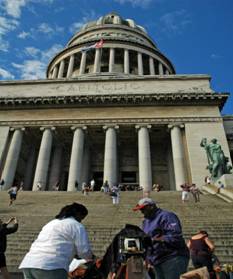
While I was having a conversation with the poet Rafael Alcides on “the human and the divine,” something we do regularly, he reminded me that the terms right and left, as applied to different political positions, appeared in Cuba at the beginning of the 1920s as a reaction to the Russian revolution of 1917. Never before in our history had they been used, having been preceded by annexationism, reformism, autonomism, independentism and, after the establishment of the Republic in 1902, by liberalism and conservatism. At the end of that period, the 1920s, they carried a certain weight, and their use reached a climax with the fall of the regime of Gerardo Machado in 1933 and in subsequent years with the legalization of the Communist Party, rechristened the Socialist People’s Party to make it more palatable to the masses.
These terms were only used, however, by communists in their propaganda, referring to themselves as being of “the left” and generalizing all their opponents as being of “the right.” In reality it was a minority party, one whose orthodox true believers led the way in the national political arena. The change came about in 1959, “the year of the accident,” when the state was proclaimed to be “leftist” and imposed its political, ideological and economic concepts on all of society. Subsequently, it tried to portray the left as the sum of all that was progressive, new, humane and good, and the right as the sum of all that was archaic, obsolete, brutal and bad. But life, that supreme judge, showed that neither left nor right were what they proclaimed themselves to be. The former showed itself to be a fraud, becoming fossilized, and the latter, reinventing itself over time, consolidated.
To speak of left and right in today’s globalized world is very anachronistic, a topic suitable for dilettantes, now that both have been bypassed by history. The terms have become so intermingled that any differences are discernible only in their extreme forms. Those who support democracy, development, and solutions to political, economic, social and environmental problems are “progressive,” while those who cling to totalitarianism, lack of freedom, backwardness and stagnation are “retrograde.” Trying to maintain this dichotomy of left and right at all costs, taking advantage of their historic meanings and even trying to inject new life into them, is a task doomed to failure.
December 16 2012
